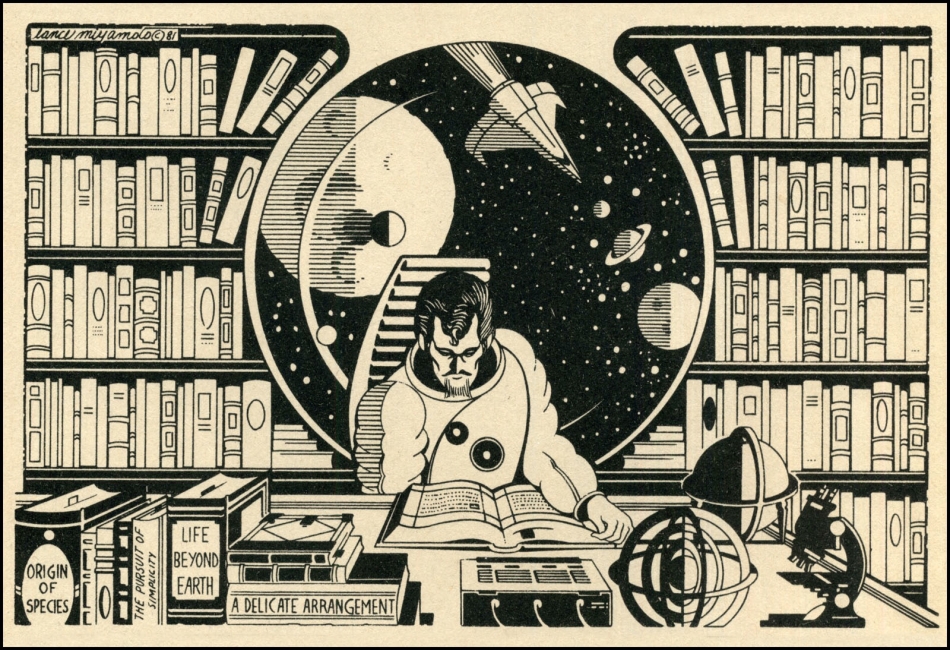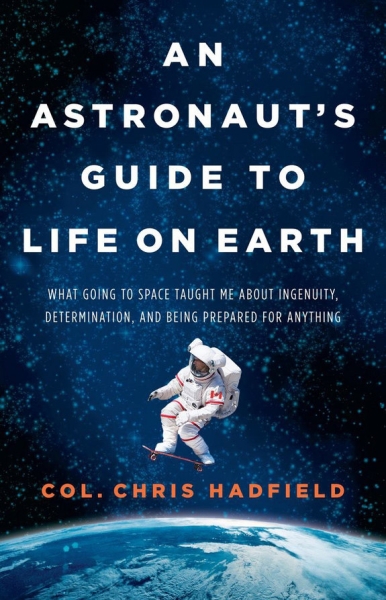Subjective hit parade of English-language space memoirs

This spring, the Russian translation of the book by Chris Hadfield "Astronaut's Guide to Life on Earth" was published. It became quite noticeable, reviews appeared in various publications. The release of the original book in 2013 somehow passed me by, but now I decided to read it. It’s not interesting to write another review of this book alone, so I decided to draw up a hit parade of English-language space memoirs. The definition of places, of course, is subjective, as they said at Absolute Games, "we can put our opinion on it."
Fifth place. Gene Kranz, “Failure is not an option”

Gene Kranz was at the very forefront of the US manned space program. By the labor of Kranz and his colleagues, the American Mission Control Center grew up in the Space Task Group. On the first missions, he worked as the head of control systems, wrote the criteria for flight readiness. If you remember reports from the American MCC or films on space subjects, the roll call “Go / No-go” is often shown there, and so the procedures for such a decision Krantz wrote. By the start of the Gemini flights, Gene had become deputy flight manager, then flight manager. At the Apollo, he was the head of flights on odd missions, including led the landing of Apollo 11 on the moon. But it really became known during the Apollo 13 mission, when the professional and dedicated work of the MCC was able to ensure the return of astronauts to Earth despite an extremely serious accident . After the completion of the program, Apollo worked as deputy director, then director of space mission management. He left NASA after the STS-61 mission, which repaired the Hubble telescope.
Despite the fact that Krantz did not say literally “failure to be excluded from the list of opportunities!”, It was the credo of his work at the MCC, so the catch phrase from the filmmakers of the Apollo 13 film was widely spread around the world, and Krantz himself made it the headline of his memoirs.
The book tells the story of the American manned program from the accident "Mercury-Redstone 1", also known as the "ten-centimeter flight", to the last mission to the moon "Apollo 17" from the position of engineer of the MCC, and then the flight director. An interesting observation: during the mission, Krantz perceived time differently, 90 minutes of one revolution fly instantly when you need to analyze flight parameters and make decisions.
Why fifth place? Despite the fact that there is nothing to complain about in the book, I still have not managed to finish reading it. Krantz speaks qualitatively, dilutes what is happening with stories, if possible, but doesn’t take your breath away from reading. At the same time, if you want to know more about how the US manned space program appeared and developed, what bumps they filled and what brilliant results they managed to achieve, these memoirs are worth trying to start reading.
Advantages:
- Unique experience. The history of the US manned space program is told from the perspective of a MCC employee.
- Sequential presentation from a person with engineering thinking.
Disadvantages:
- There is no publication in Russian.
- Somewhat dry presentation, I want more of "human".
The book is partially uploaded to Google Books.
Fourth place. Chris Hadfield, "Astronaut's Guide to Life on Earth"

Chris Hadfield made three flights into space, spent the most time there among all Canadian astronauts and became the first and so far the only Canadian ISS commander. Also, is the only Canadian who visited the Mir station. But, perhaps, he is best known as an astronaut who sang in space a cover of David Bowie's song Space Oddity. After returning to Earth in 2013, he ended his career as an astronaut and wrote memoirs. Accordingly, the book tells about the life of Chris, how he decided to become an astronaut, built his life so as not to lose this opportunity, passed the selection for astronauts of the Canadian Space Agency, made two flights on a shuttle and spent six months on the ISS.
Why fourth place? According to the book, it seems that Headfield is a kind of Hermione from astronautics. Give him a handwheel of time, and he uses it to spend another couple hundred hours on training and further training. It is often said that you need to prepare, and prepare a lot, and this places the book in some places becomes boring and moralizing. The first 30-50% of the book I generally read through force. Only in the second half does the narrative sometimes become lively, usually when Chris begins to have problems. The book seems smoothed, Hadfield does not scold anyone, which makes us doubt that he tells us everything he thinks. He even talks about the deceased friend of the pilot so evenly that he doubts whether he had any friends at all? On the other hand,
Advantages:
- The most modern memoirs. If you want to know how they live and work on the ISS now, this book is worth keeping in mind.
- There is a publication in Russian.
Disadvantages:
- In some places, the book seems boring and edifying.
Preview books on Google Books
Third place. Tom Wolfe, The Right Stuff

Tom Wolfe is a journalist who met astronauts when, on instructions from the editorial staff, he covered the Apollo 17 mission. Seen so interested in him that he spent seven years studying the American space program. Initially, Wolfe wanted to write a book about the history of the space program, but as a result he got a fictionalized story about test pilots and the first astronauts. Most likely, this particular book gave rise to the paths of space literature - “selection difficulties”, “lost pilot-friend”, “fraternity and competition”, which can be found in later memoirs. The book became a bestseller; after just four years, an excellent film of the same name was made.
By the way, translating the name as “The Right Thing” is no good. The right stuff in the book is “the right qualities of character”, “the right stuff” from which test pilots and astronauts are made. There is no such term in Russian, “guys what you need” is not perfectly accurate, but probably the best option.
Advantages:
- It is read as an adventure novel, despite the fact that the book is based on real events.
- There is a translation into Russian.
Disadvantages:
- Fiction doesn’t work very well with authenticity. Wolfe is still a journalist. If possible, the facts from the book should be checked from other sources.
Preview on Google books
Second place. Jim Lovell, Jeffrey Kluger, “The Lost Moon”

Jim Lovell is an astronaut who made two flights on the Gemini ships, circled the moon on Apollo 8 and had an accident on Apollo 13. Jeffrey Kluger is a journalist and writer who wrote for Time and has written several books about space travel. The tandem of an astronaut who personally experienced dramatic events, and a journalist who knows the language and dramatic tricks, spawned an excellent book, which, despite the documentary of facts, falls into the classic four stories of Borges with a difficult and long return home. A year later, the wonderful Apollo 13 movie was shot from the book.
In addition to a detailed account of the flight of Apollo 13, the book also speaks of the tragedy of Apollo 1, the life of astronauts, and specifically Lovell. The brotherhood of astronauts is perfectly shown, I still remember the episode where one of the astronauts was sure, despite all the technical calculations, that if he were the fourth in the cockpit of Apollo 1, helping Grissom, White and Chuffy to understand the equipment, then could open the hatch pressed by excessive pressure ...
Advantages:
- A dramatic story that you want to read and reread.
Disadvantages:
- Hartikov's translation of "torn" quality, there are very stupid mistakes.
The book was unlucky with paranoid copyright holders, there is not even a preview on Google Books. But, they say, somewhere there is an audiobook in which, part of the text is read by Lovell himself.
First place. Mike Mullein, "Riding Rockets: The Outrageous Tales of a Space Shuttle Astronaut"

Mike Mullein wanted to become an astronaut since childhood. The dark sky of Albuquerque, a fascination with astronomy, and then the USSR launched the first satellite. Mike even wrote a letter to NASA asking them to recruit children for astronauts to save weight. But astigmatism closed the way for him into space at the time of the Apollo. Without losing hope of becoming an astronaut, Mullein went to military pilots. Vision did not allow to become a pilot; he was an operator of weapons on two-seater Phantoms. In 1978, the Space Shuttle astronauts began recruiting, requirements were lower, and Mullane managed to pass it. He made three flights on a shuttle, two of them with secret military missions. He left NASA in the 90s, became a motivational speaker. Memoirs came out in 2006.
The book is remarkable for its lively presentation. The dramatic selection process, where Mullane goes astray from the psychologist and goes through the following steps in the belief that he has already failed. Brotherhood of 35 astronauts of the 1978 recruitment, jokes on the bulletin board, field trips. Unknown rules for determining who will fly first, guesses and distrust. The first flights and the first successes. The Challenger crash. Resume flights and military missions with secret satellites.
Mullein writes very frankly, revealing a multitude of topics, from feminism and sexist jokes among astronauts to harsh criticisms of how John Young led the Space Shuttle astronauts and flaws.
In addition to purely cosmic topics, the book interestingly shows a section of American society of that time. For example, Mullein is not afraid to talk about how the Catholic family of his future wife solved the problem of her illegitimate pregnancy.
Mullein does not regret himself in frankness - I remember an episode in which he writes how he struggled to refrain from cheating on his wife and girlfriend-astronaut.
And, of course, there is a lot of physiology - space toilets , space toilet jokes, a dramatic choice of condom size on the urinal.
Despite the abundance of aviation and technical terms, the language of the book is simple and easy to read in the original.
Advantages:
- Unique in language, style and content of the book.
Disadvantages:
- No translation into Russian.
- Age limit 12+ minimum.
Preview on Google Books.
About domestic memoirs wrote here .
Have you read other foreign space memoirs? What can you recommend?
